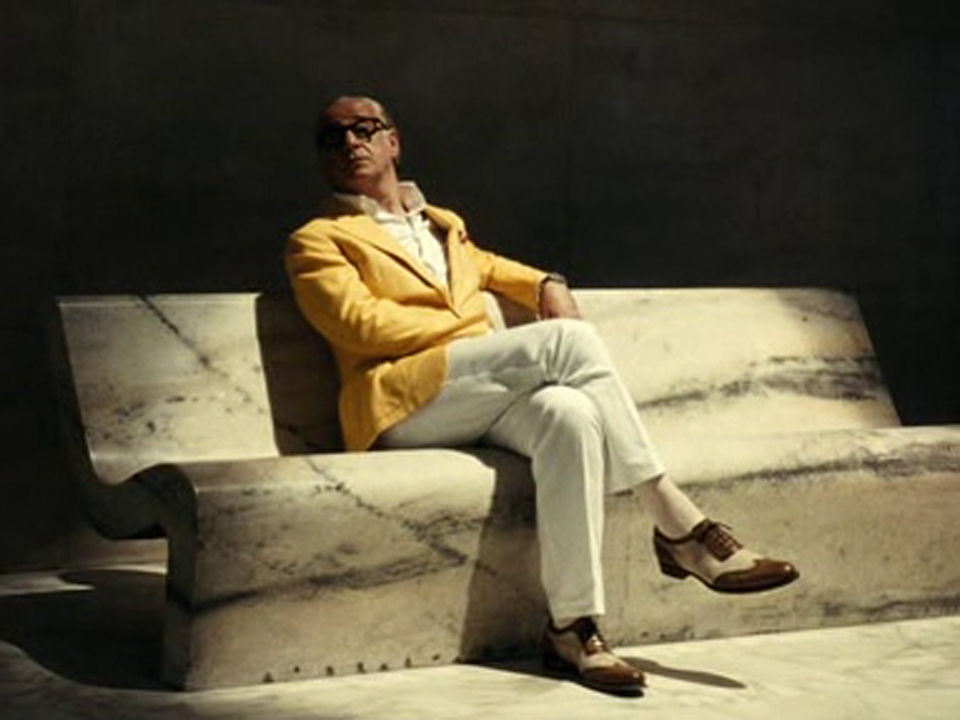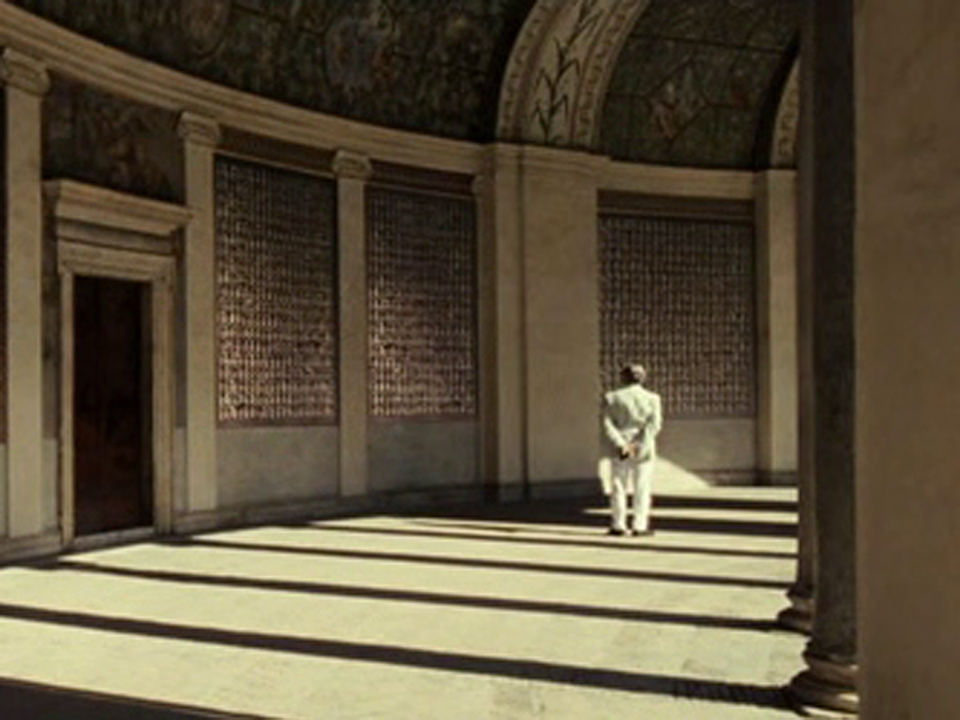Filtered by: Lifestyle
Lifestyle
Movie review: ‘La Grande Bellezza’ is beautifully absurd, and absurd in its beauty
By RIE TAKUMI, GMA News
"La Grand Bellezza" was shown as a part of the Italian film festival in July 2014.
 What is life's "great beauty?"
What is life's "great beauty?"
Much like its structure, Paolo Sorrentino's "La Grand Bellezza" ("The Great Beauty") does not have a straightforward answer. Rather than give it definitive form, the film allows audiences to find an answer for themselves as it flows through the day-to-day affairs of Jep Gambardella—a one-time novelist, renowned critic, and hedonist—as he realizes that at his age, he "can't waste time any more time doing things" he doesn't want to do.
And those things, apparently,included throwing extravagant parties, having sex with women half his age, and entertaining performance artists who hurled themselves headlong into the brick-walled aqueducts as statements against Russia.
Yet this is not "The Bucket List"—Jep doesn't try to get away from those things willingly. Rather, he returns to what he truly wants in life via small realizations in his daily affairs, carefully curated for the best cinematic effect.
Given that his life was given over to being the "king of the high life," it shouldn't be surprising that Jep pursued simplicity, or at least frankness. As The Saint, whose presence frames the third act of the film, kindly put into words, "roots are important" and lead to a life worth writing about.
Returning to his roots, the act of which was shot in beautiful contrast to the established palette of the film, stirs up Jep's passions once more, leading to a pay-off that can either satiate or convince audiences that they haven't completely wasted their time.
While the way the film threads Jep's extraordinary life together seamlessly, a part of the sentimentality it expects audiences to feel relies on very specific categories. Such categories—age, spirituality, and knowledge of how art shows work—may hinder audiences from connecting to the film emotionally.
 Despite this, Toni Servillo's portrayal of Jep really endears the character to the audience. In the hands of other, less able actors, the audience may not have witnessed the age, experience, and emotion Servillo packed into the micro-expressions and half-formed smiles he plasters on for the camera.
Despite this, Toni Servillo's portrayal of Jep really endears the character to the audience. In the hands of other, less able actors, the audience may not have witnessed the age, experience, and emotion Servillo packed into the micro-expressions and half-formed smiles he plasters on for the camera.
Carlo Verdone's Romano lovingly compliments Servillo's tired suaveness with painful earnestness and at times cringe-worthy optimism. This earnestness is present in Giusi Merli's portrayal of the venerable Santa, though dampened by wrinkles and a full life putting conviction behind each of her brief words.
Sabrina Ferilli's Ramona, meanwhile, displayed a classiness that couldn't be found in younger socialites as a middle-aged stripper. And while she was free of pretensions, Galatea Ranzi's Stefania picked up the slack and built up a holier-than-thou attitude, brought down brutally and beautifully by Jep in an iconic scene.
Cinematography translated the unspoken struggles of Jep and his acquaintances as they slowly aged, with a Rome almost presented as the 65-year-old's physical companion. Tourist gabs such as the Coliseum presented familiar sights to international audiences, but the night life seen there should be familiar who frequents Bonifical Global City clubs and their like.
The cinematography also makes it understandable as to why the film is called "The Great Beauty." The film itself remains ambiguous on what it regards as that beauty, it helps audiences see why Jep had been content to linger in this state before having a delayed midlife crisis.
What immediately struck me about "Bellezza," other than the crisp colors shown of Rome, was the visceral reaction that my fellow reviewers had. Perhaps this reaction was also the reason the Italian Embassy's Deputy Head of Mission Alfonso Tagliaferri mentioned during MovieMov's press preview that Italian reviewers were critical of the film. Much of the absurdity and thrill of the piece, for art and society reviewers at least, comes from the fact that it was essentially a snapshot of their lives.
One way of interpreting the film's message is this: Eccentric, talentless artists, lecherous old-timers in grandiose parties, casual use of botox, and colleagues blowing their meager achievements out of proportion is apparently run of the mill when you become known for covering art, society, and lifestyle events. Apparently.
 But even without the meta commentary, the film's absurdity will not be lost on audiences, regardless of their educational or economic background. The Italian sense of humor, as Tagliaferri pointed out, is similar to the Filipino's, as physical humor and crude jokes are common in both modes.
But even without the meta commentary, the film's absurdity will not be lost on audiences, regardless of their educational or economic background. The Italian sense of humor, as Tagliaferri pointed out, is similar to the Filipino's, as physical humor and crude jokes are common in both modes.
"Ang Babae sa Septic Tank," though playing with film tropes, is comparable to "Bellezza" in the way of making fun of its subjects. Compare filmmakers Rainier and Bingbong's visions of how their poverty porn should look like, to how Jep gives advice or makes observations. Subversions are done with the intent of showing how illogical they are, yet they are done affectionately.
Perhaps the foreign setting and title, not to mention its prestige at the 2014 Academy Awards, might be enough to remove it from a regular moviegoer's fare. It's a shame, as "Bellezza's" form of contemplation affords audiences the choice to linger at its outward beauty—like Jep—and just like Jep again, go deeper to find their roots.
After all, it wasn't distinguished for more than 43 awards for just a trick. — VC, GMA News

"La Grand Bellezza" ("The Great Beauty") follows on-time author and famous critic Jep Gambardella's introspective sauntering through Rome's extravagant society and art scene. It won the 2014 Academy Awards, Golden Globes, César Awards, and British Academy of Film and Television Arts's Best Foreign Language Film, as well as the Lino Brocka award at the 2013 Cinemanila International Film Festival. All screenshots from movie
Much like its structure, Paolo Sorrentino's "La Grand Bellezza" ("The Great Beauty") does not have a straightforward answer. Rather than give it definitive form, the film allows audiences to find an answer for themselves as it flows through the day-to-day affairs of Jep Gambardella—a one-time novelist, renowned critic, and hedonist—as he realizes that at his age, he "can't waste time any more time doing things" he doesn't want to do.
And those things, apparently,included throwing extravagant parties, having sex with women half his age, and entertaining performance artists who hurled themselves headlong into the brick-walled aqueducts as statements against Russia.
Yet this is not "The Bucket List"—Jep doesn't try to get away from those things willingly. Rather, he returns to what he truly wants in life via small realizations in his daily affairs, carefully curated for the best cinematic effect.
Given that his life was given over to being the "king of the high life," it shouldn't be surprising that Jep pursued simplicity, or at least frankness. As The Saint, whose presence frames the third act of the film, kindly put into words, "roots are important" and lead to a life worth writing about.
Returning to his roots, the act of which was shot in beautiful contrast to the established palette of the film, stirs up Jep's passions once more, leading to a pay-off that can either satiate or convince audiences that they haven't completely wasted their time.
While the way the film threads Jep's extraordinary life together seamlessly, a part of the sentimentality it expects audiences to feel relies on very specific categories. Such categories—age, spirituality, and knowledge of how art shows work—may hinder audiences from connecting to the film emotionally.

Jep Gambardella (Toni Servillo) surveys murals of a man who took pictures of himself everyday. His own journey throughout his 65 years in life goes mostly unremembered, with days of partying melding onto a hot mess. "Bellezza" uses visual metaphors to supplement an already-flowery script. And while it came off as pretentious at times, its earnestness and eye-watering cinematography makes it an easily-digestible flick.
Carlo Verdone's Romano lovingly compliments Servillo's tired suaveness with painful earnestness and at times cringe-worthy optimism. This earnestness is present in Giusi Merli's portrayal of the venerable Santa, though dampened by wrinkles and a full life putting conviction behind each of her brief words.
Sabrina Ferilli's Ramona, meanwhile, displayed a classiness that couldn't be found in younger socialites as a middle-aged stripper. And while she was free of pretensions, Galatea Ranzi's Stefania picked up the slack and built up a holier-than-thou attitude, brought down brutally and beautifully by Jep in an iconic scene.
Cinematography translated the unspoken struggles of Jep and his acquaintances as they slowly aged, with a Rome almost presented as the 65-year-old's physical companion. Tourist gabs such as the Coliseum presented familiar sights to international audiences, but the night life seen there should be familiar who frequents Bonifical Global City clubs and their like.
The cinematography also makes it understandable as to why the film is called "The Great Beauty." The film itself remains ambiguous on what it regards as that beauty, it helps audiences see why Jep had been content to linger in this state before having a delayed midlife crisis.
What immediately struck me about "Bellezza," other than the crisp colors shown of Rome, was the visceral reaction that my fellow reviewers had. Perhaps this reaction was also the reason the Italian Embassy's Deputy Head of Mission Alfonso Tagliaferri mentioned during MovieMov's press preview that Italian reviewers were critical of the film. Much of the absurdity and thrill of the piece, for art and society reviewers at least, comes from the fact that it was essentially a snapshot of their lives.
One way of interpreting the film's message is this: Eccentric, talentless artists, lecherous old-timers in grandiose parties, casual use of botox, and colleagues blowing their meager achievements out of proportion is apparently run of the mill when you become known for covering art, society, and lifestyle events. Apparently.

The Saint (Giusi Merli) bares a gap-toothed smile at an almost-supernatural event. The film's unique cast of characters are unrelentingly human, and though most serve as backgrounds to Jep's development, they remain unique and irreplaceable. The city itself is as much of a character as its inhabitants, as it shows "the great beauty" which eludes everyone for most of the film.
"Ang Babae sa Septic Tank," though playing with film tropes, is comparable to "Bellezza" in the way of making fun of its subjects. Compare filmmakers Rainier and Bingbong's visions of how their poverty porn should look like, to how Jep gives advice or makes observations. Subversions are done with the intent of showing how illogical they are, yet they are done affectionately.
Perhaps the foreign setting and title, not to mention its prestige at the 2014 Academy Awards, might be enough to remove it from a regular moviegoer's fare. It's a shame, as "Bellezza's" form of contemplation affords audiences the choice to linger at its outward beauty—like Jep—and just like Jep again, go deeper to find their roots.
After all, it wasn't distinguished for more than 43 awards for just a trick. — VC, GMA News
Find out your candidates' profile
Find the latest news
Find out individual candidate platforms
Choose your candidates and print out your selection.
Voter Demographics
More Videos
Most Popular





